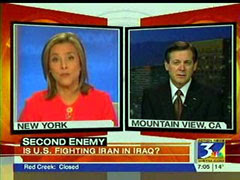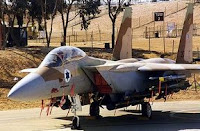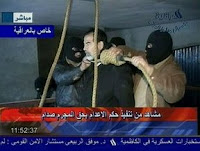I was recently interviewed by Gareth Porter of the Inter Press Service News Agency for an article, Israeli Realism on Iran Belies Threat Rhetoric.
Here is the text:
POLITICS: Israeli Realism on Iran Belies Threat Rhetoric
Analysis by Gareth Porter*
WASHINGTON, Jan 30 (IPS) - When Israeli Prime Minister Ehud Olmert declared last week at the Herzliya conference that Israel could not risk another "existential threat" such as the Nazi holocaust, he was repeating what has become the dominant theme in Israel's campaign against Iran -- that it cannot tolerate an Iran with the technology that could be used to make nuclear weapons, because Iran is fanatically committed to the physical destruction of Israel.
The internal assessment by the Israeli national security apparatus of the Iranian threat, however, is more realistic than the government's public rhetoric would indicate.
Since Iranian President Mahmoud Ahmadinejad came to power in August 2005, Israel has effectively exploited his image as someone who is particularly fanatical about destroying Israel to develop the theme of Iran's threat of a "second holocaust" by using nuclear weapons.
But such alarmist statements do not accurately reflect the strategic thinking of the Israeli national security officials. In fact, Israelis began in the early 1990s to use the argument that Iran is irrational about Israel and could not be deterred from a nuclear attack if it ever acquired nuclear weapons, according to an account by independent analyst Trita Parsi on Iranian-Israeli strategic relations to be published in March. Meanwhile, the internal Israeli view of Iran, Parsi told IPS in an interview, "is completely different."
Parsi, who interviewed many Israeli national security officials for his book, says, "The Israelis know that Iran is a rational regime, and they have acted on that presumption." His primary evidence of such an Israeli assessment is that the Israelis purchased Dolphin submarines from Germany in 1999 and 2004 which have been reported to be capable of carrying nuclear-armed cruise missiles.
It is generally recognised that the only purpose of such cruise-missile equipped submarines would be to deter an enemy from a surprise attack by having a reliable second strike capability. Despite the fact that Israel has long been known to possess at least 100 nuclear weapons, Israeli officials refuse to discuss their own nuclear capability and how it relates to deterring Iran.
Retired U.S. Air Force Lt. Col. Rick Francona, a former Pentagon official who visited Israel last November, recalls that Israeli officials uniformly told his group of eight U.S. military analysts they believed Iran was "perfectly willing to launch a first strike against Israel," if it obtained nuclear weapons.
But when they were asked about their own nuclear capabilities in general, and the potentially nuclear-armed submarine fleet in particular, Francona says, the Israelis would not comment.
In fact, Israeli strategic specialists do discuss how to deter Iran among themselves. An article in the online journal of a hard-line think-tank, the Ariel Centre for Policy Research, in August 2004 revealed that "one of the options that has been considered should Iran publicly declare itself to have nuclear weapons is for Israel to put an end to what is called its policy of 'nuclear ambiguity' or 'opacity'."
The author, Shalom Freedman, said that in light of Israel's accumulation of "over 100 nuclear weapons" and its range of delivery systems for them, even if Iran were to acquire nuclear weapons within a few years, the "tremendous disproportion between the strength of Israel and an emergent nuclear Iran should serve as a deterrent."
Even after Ahmadinejad's election in mid-2005, a prominent Israeli academic and military expert has insisted that Israel can still deter a nuclear Iran. In two essays published in September and October 2005, Dr. Ephraim Kam, deputy head of the Jaffee Centre for Strategic Studies at Tel Aviv University and a former analyst for the Israeli Defence Forces, wrote that Iran had to assume that any nuclear attack on Israel would result in very serious U.S. retaliation.
Therefore, even though he regarded a nuclear Iran as likely to be more aggressive, Kam concluded it is "doubtful whether Iran would actually exercise a nuclear bomb against Israel -- or any other country -- despite its basic rejection of Israel's existence."
Kam also pointed out that the election of a radical like Ahmadinejad would not change the fundamental Iranian policy toward Israel, because even the more moderate government of President Mohammad Khatami had already held the position that the solution to the Palestinian problem should be the establishment of a Palestinian state in place of the Zionist Israeli state. Furthermore, he wrote, Iran's basic motive for aspiring to nuclear weapons in the first place had not been to destroy Israel but to deter Saddam Hussein's Iraq and later to deter the United States and Israel.
Despite the existence of a more realistic appraisal of the actual power balance and its implications for Iranian behaviour, Israeli officials do not see it as in their interest to even hint at the possibility of deterring a nuclear Iran. "They don't talk about that," Meir Javedanfar, an Iranian-born analyst based in Tel Aviv, told IPS, "because they don't want to admit the possibility of defeat on Iran's nuclear programme. They want to stop it."
Occasionally, Israeli officials do let slip indications that their fears of Iran are less extreme than the "second holocaust" rhetoric would indicate. Last November, Deputy Defence Minister Ephraim Sneh explained candidly in an interview with the Jerusalem Post that the fear was not that such weapons would be launched against Israel but that the existence of nuclear capability would interfere with Israel's recruitment of new immigrants and cause more Israelis to emigrate to other countries.
Sneh declared that Ahmadinejad could "kill the Zionist dream without pushing a button. That's why we must prevent this regime from obtaining nuclear capability at all costs."
Israel's frequent threat to attack Iran's nuclear facilities is also at odds with its internal assessment of the feasibility and desirability of such an attack. It is well understood in Israel that the Iranian situation does not resemble that of Iraq's Osiris nuclear reactor, which Israeli planes bombed in 1981. Unlike Iraq's programme, which was focused on a single facility, the Iranian nuclear programme is dispersed; the two major facilities, Natanz and Arak, are hundreds of miles apart, making it very difficult to hit them simultaneously.
In mid-2005, Yossi Melman, who covers intelligence issues for the daily newspaper Haaretz, wrote, "According to military experts in Israel and elsewhere, the Israel Air Force does not have the strength that is needed to destroy the sites in Iran in a preemptive strike..." He added that that the awareness of that reality was "trickling down to the military-political establishment".
Javedanfar, Melman's co-author in the forthcoming book on Iran's nuclear programme, agrees. "There is no way the Israelis are going to do it on their own," he said.
That is also the conclusion reached by Francona and other Air Force analysts. Francona recalls that he and two retired U.S. Air Force generals on the trip to Israel told Israeli Air Force generals they believe Israel does not have the capability to destroy the Iranian nuclear targets, mainly because it would require aerial refueling in hostile airspace. "The Israeli officers recognised they have a shortfall in aerial refueling," Francona says.
In the end, the Israelis know they are dependent on the United States to carry out a strike against Iran. And the United States is the target of an apocalyptic Israeli portrayal of Iran that diverges from the internal Israeli assessment.
*Gareth Porter is an historian and national security policy analyst. His latest book, "Perils of Dominance: Imbalance of Power and the Road to War in Vietnam", was published in June 2005.















.jpg)

